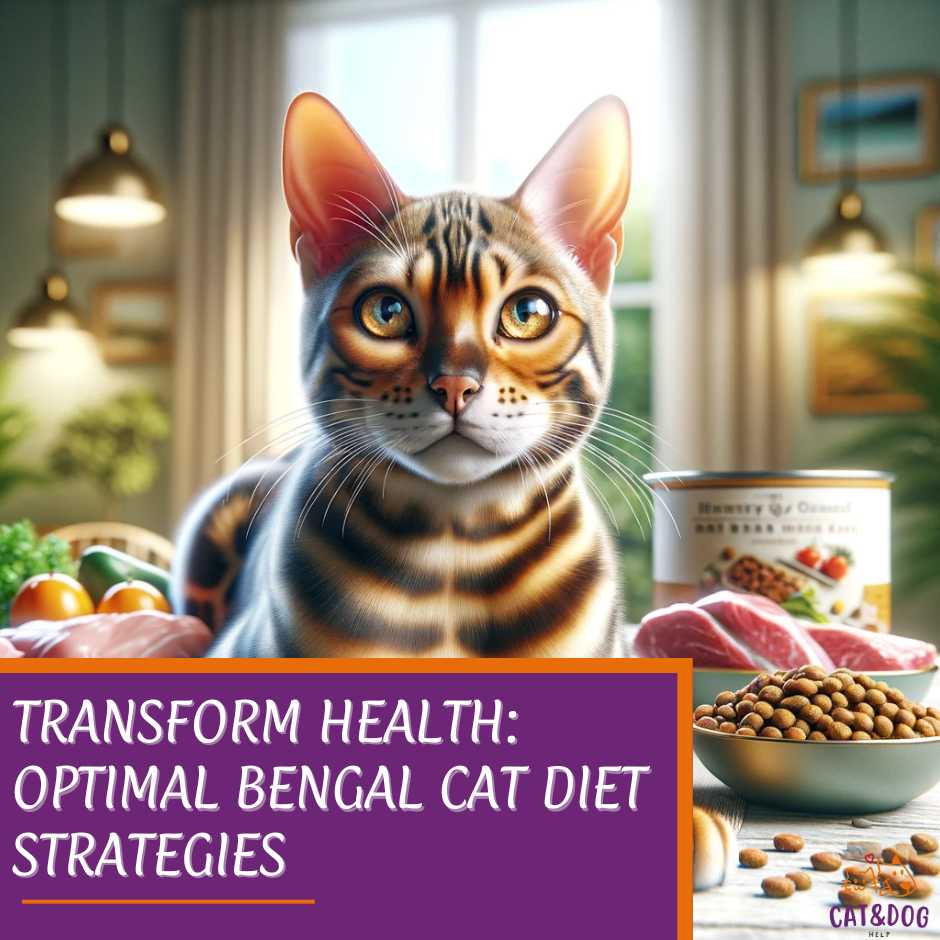Bengal cats, with their striking wild appearance and energetic demeanor, are a marvel to behold. Did you ever wonder what fuels these vibrant felines?
Originating from a hybrid between domestic cats and the Asian leopard cat, Bengals have a set of dietary needs that closely mirror their wild ancestry.
It’s not just about keeping their tummy full; it’s about maintaining their health, supporting their high energy levels, and ensuring they thrive in your care.
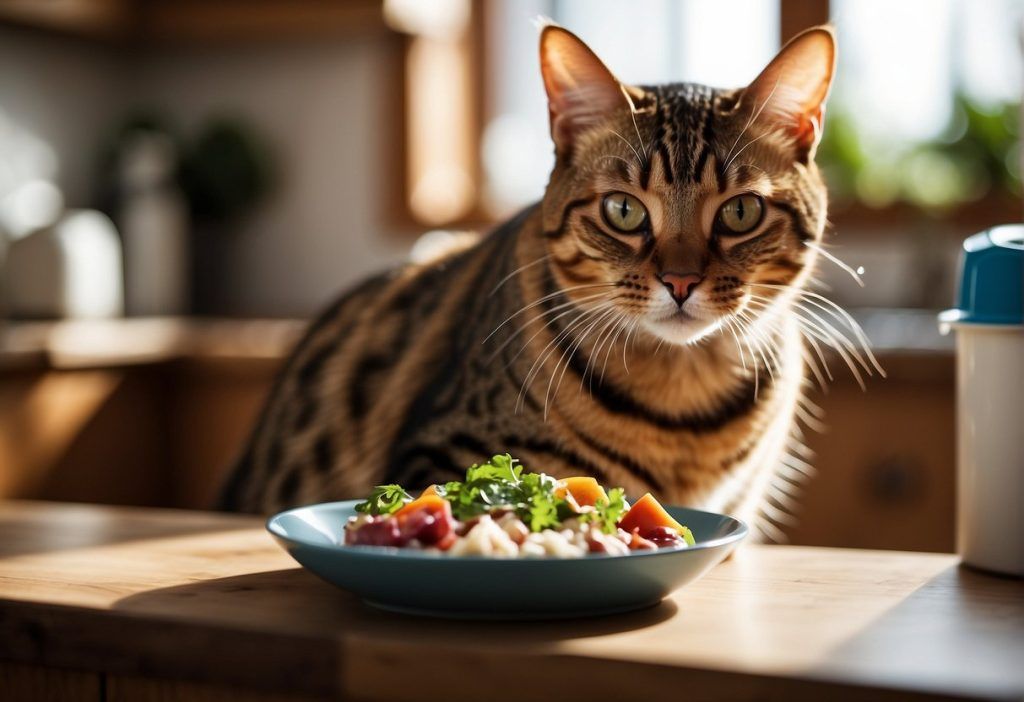
Feeding your Bengal cat can be an adventure akin to exploring the jungles they come from. Unlike your average housecat, Bengals require a diet rich in proteins to mimic the prey they would naturally hunt.
But don’t think you need to turn your home into a hunting ground!
Understanding what constitutes a balanced and nutritious diet for your Bengal is key to preventing health issues and keeping your feline friend in tip-top shape.
Key Takeaways
- Bengal cat diet thrive on a high-protein diet that is similar to what their wild relatives would eat.
- A proper diet for a Bengal cat includes a mix of muscle meat, organs, and bones, and should be rich in essential nutrients like taurine.
- Careful selection of commercial cat food or preparation of a homemade diet can prevent dietary-related health issues in Bengal cats.
Understanding Bengal Cats
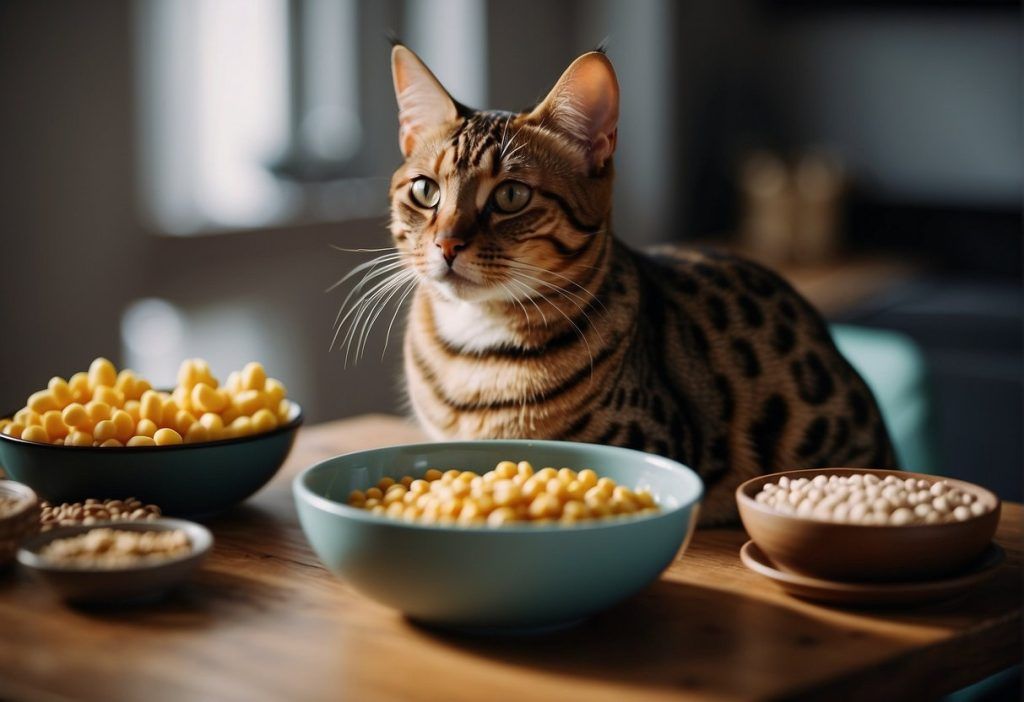
Unique Characteristics of Bengal Cats
Ever wondered what makes a Bengal cat so special? Firstly, their striking coat, resembling a wild leopard’s, sets them apart. (1)
They sport an array of patterns from rosettes to marbling, in various hues that captivate anyone’s glance.
With a pelt that’s not only gorgeous but also uniquely soft to the touch, it’s no surprise Bengals are often the center of attention.
Physical Attributes
Check out these distinguishing features:
- Coat: Rich in color, with unique patterns like rosettes and marbling.
- Build: A sturdy, muscular body that screams agility.
Did you know? A Bengal cat’s glittery coat is not just for show; it’s a genetic trait!
Behavior and Temperament
Are Bengals as lively as they look? You bet! These felines have energy to spare and a love for exploration. Are you ready for a game of fetch? Because your Bengal certainly is.
It’s a cat that combines feral enthusiasm with affectionate companionship.
Health Considerations for Bengal Cats
Common Health Issues
Here’s a peek into their health book:
- Hereditary issues: Like other purebreds, they’re prone to certain genetic conditions.
- Heart health: Keep an ear out for HCM, a heart condition, among Bengals.
Importance of Diet in Health Management
Now, let’s talk nutrition. Did you realize diet is paramount in sidestepping those health pitfalls? It’s like the saying goes, “You are what you eat,” and for Bengals, this couldn’t be truer.
High-quality protein isn’t a fancy term—it’s a requirement to keep your agile friend bounding up those stairs. And those amino acids, like taurine, are not just buzzwords; they’re essentials for heart and eye health.
Remember, their exotic ancestry doesn’t just influence looks but demands a diet that’s up to par. Keep that in mind next time you’re perusing the pet food aisle!
Essential Nutrients for Bengal Cat Diet
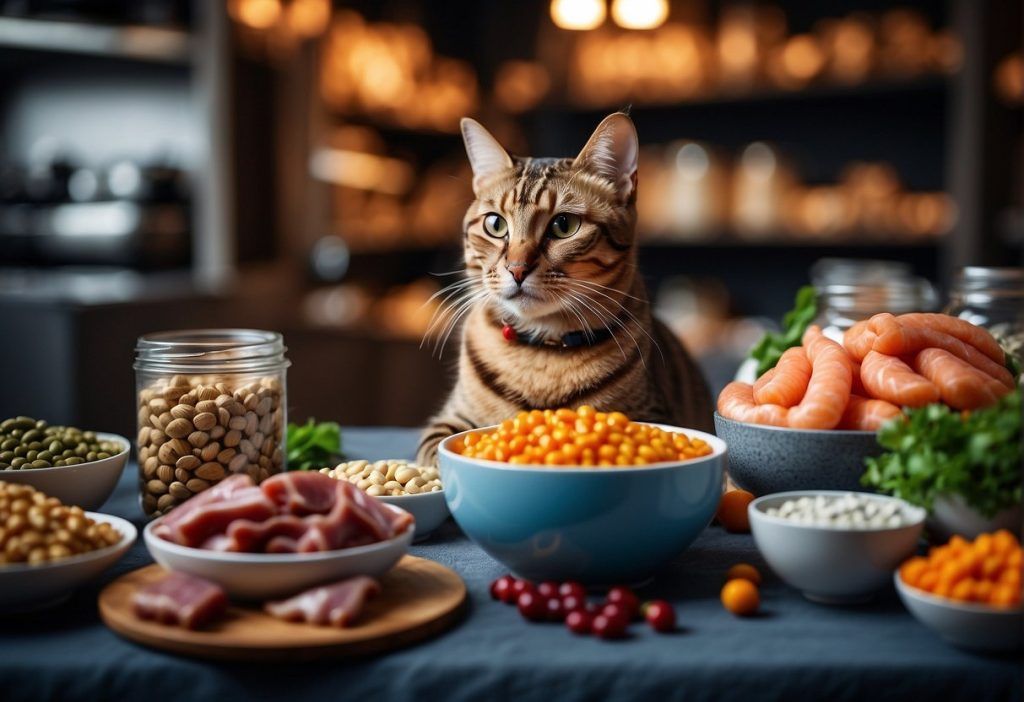
When it comes to your Bengal cat’s diet, you’re looking for the best mix of flavor and nutrition, aren’t you? Let’s zero in on the key nutrients that will keep your feline friend healthy and content.
Macronutrients: Remember, proteins are the cornerstone of your Bengal’s diet. (2)
Ideal sources include:
- Chicken
- Turkey
- Fish (like salmon)
These aren’t just tasty; they’re packed with essential amino acids! Fats are vital too, providing energy and aiding nutrient absorption. Think more along the lines of omega-3 and omega-6 fatty acids from fish oils.
As for carbohydrates, less is often more; a small amount of vegetables or rice can provide fiber and energy.
Balancing Fats and Carbohydrates: Finding the right balance can be tricky, but it’s simple really. Your Bengal cat doesn’t need a lot of carbs. Just enough for energy without the bulk.
Fats should be moderated too—too much and you’re looking at a not-so-svelte kitty!
Vitamins and Minerals: Did you know that certain vitamins and minerals are non-negotiable for your Bengal’s health? Check out these must-haves:
| Vitamins | Why They’re Important |
|---|---|
| Vitamin A | For those bright eyes |
| Vitamin E | Protects cells from damage |
| Vitamin D | Healthy bones and teeth |
Minerals are just as crucial, so let’s make sure your cat’s diet includes:
- Calcium (for strong bones)
- Phosphorus (a partner to calcium)
- Magnesium (for nerve function)
Your Bengal cat’s diet is more than just a bowl of food; it’s the foundation of their vitality. Keep these nutrients in mind and you’ll have a happy, healthy cat with a coat that glows and energy that never fades.
Don’t think of it as a chore; think of it as the purr-fect way to show your Bengal cat some love!
Feeding Your Bengal Cat
Recommended Cat Foods for Bengals
Wondering what’s on the menu for your Bengal cat? Let’s serve up some options. Bengals are obligate carnivores, so meat should be the star of their diet.
Besides focusing on their main diet, incorporating healthy cat snacking into your Bengal’s routine can contribute positively to their overall nutrition and provide enjoyable variety. Choose snacks that are high in protein and low in carbs to align with their dietary needs.
High-protein, low-carb is the way to go, whether you choose commercial or homemade foods.
Commercial Cat Foods
Have you ever strolled down the pet food aisle, confused by the choices? For your Bengal, look for brands with real meat as the first ingredient.
A bit of research can uncover options that are high in animal protein and fats, just like their diet in the wild. Some Bengals can be sensitive to grains, so grain-free formulas might be your best bet. (3)
Specific Brand Recommendations:
- Wet Foods: High moisture content can keep your Bengal hydrated.
- Dry Foods: Less moisture, but convenient. Look for the ones with the protein punch!
Pros:
- Convenient
- Balanced nutrition
- Long shelf life
Cons:
- Some brands may use fillers
- Can be expensive, depending on the brand
Homemade Diet Options
Thinking of playing chef? If you go homemade, balance is key. Cats need the right mix of protein, fats, and vitamins.
Nutritional Guidelines:
- Protein: Cooked or raw meat; think chicken, beef, or turkey.
- Fat: Essential for energy; include animal fats.
- Taurine: Critical for Bengal health; found in heart and liver meat.
Homemade Recipes:
- Simple Chicken Feast: Mix cooked chicken, a bit of liver, and a taurine supplement.
Age-Specific Dietary Needs
Kitten Nutrition: Your Bengal kitten is like a little energy machine. They need more protein, fats, and calories to fuel their growth and mischief.
Senior Cat Diet Considerations: As your Bengal ages, you may need to adjust their diet. Lower-calorie foods can help manage weight since seniors aren’t as active.
Always keep your vet in the loop, okay? They’re like your co-pilot on your Bengal’s health journey. Need more personalized advice? They’ve got your back!
Addressing Health and Dietary Issues
Have you ever wondered if your Bengal cat’s sneeze could be a sign of a food allergy? Identifying allergies in Bengals is similar to detective work.
Start by noting symptoms like itchy skin, digestive problems, or ear infections. Consult your vet, they might suggest an elimination diet to pinpoint the culprit. (4)
What if your Bengal buddy has food sensitivities? Don’t fret, there are alternative food options:
- Single-protein diets: These can reduce the risk of allergic reactions.
- Hydrolyzed protein diets: Where proteins are broken down so the immune system doesn’t react.
- Limited ingredient diets: These keep the menu simple to avoid common allergens.
If your Bengal is looking more like a mini-tiger in size, here’s some advice on managing obesity through diet:
- Replace high-carb foods with high-protein, low-fat options.
- Measure meals to avoid overfeeding.
- Introduce wet food to help feel full with fewer calories.
Finally, for those special Bengals with medical conditions, dietary changes can be a game-changer. For example:
- Diabetic cats may require low-carbohydrate diets.
- Cats with kidney issues benefit from specialized renal diets.
Always remember, changes in diet should be gradual and under the guidance of your vet. Because after all, a happy Bengal means a happy home!
Additional Tips and Advice
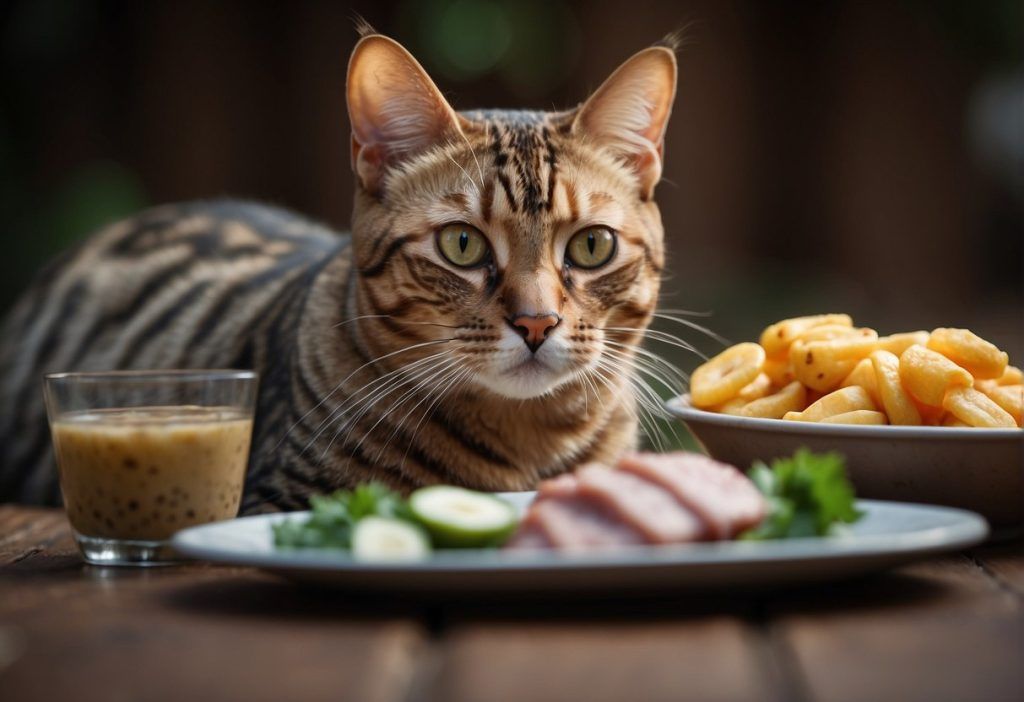
Transitioning to a New Diet
Hey there! Thinking of switching up your Bengal menu? Consistency is key. Gradually introduce new norms so that your feline friend doesn’t turn up their whiskers at dinner time. (5)
Start by mixing a small amount of the new grub with their old favorites, gradually increasing the ratio over a week or so. Patience is a virtue here!
Monitoring Cat’s Response
How’s your kitty coping? Keep a watchful eye for any tummy upsets or changes in appetite – these are important clues.
If your Bengal seems more like a couch potato than a jungle royalty after a diet swap, it might not be sitting well with them.
Consultation with Veterinarians
Not sure if the new diet’s the cat’s meow? When in doubt, book a chat with your vet. Seeking professional advice can save you a lot of guesswork, especially when it comes to your cat’s nutrition. (6)
Trust me, it’s worth it for the purrs!
Regular Health Check-ups
Remember, an ounce of prevention is worth a pound of cure. Scheduling regular vet visits can help ensure the diet you’re providing is one fit for a Bengal king or queen.
Your vet’s keen eye can catch small issues before they become big meow-tains to climb.
Starting to get the picture? Your Bengal cat’s diet is super important, but it’s not set in stone!
Keep an eye out, blend changes slowly, chat with your vet, and those regular check-ups will help keep your feisty feline feeling fantastic. Happy feeding!
Conclusion
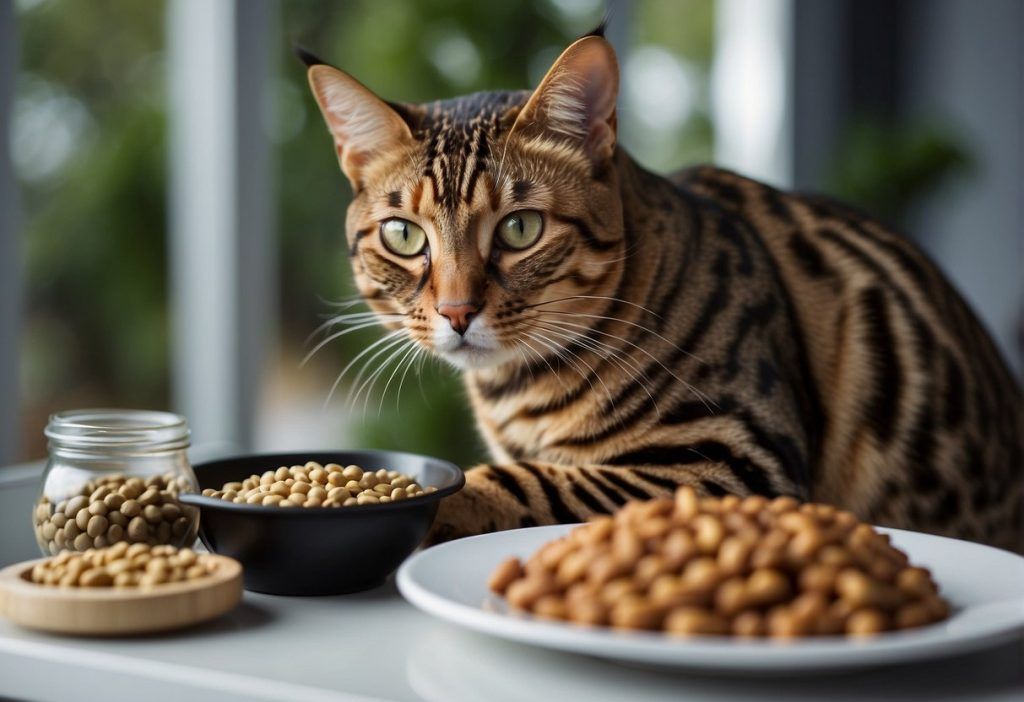
You’ve been on quite the journey getting to know the nitty-gritty of your Bengal’s dietary needs. Let’s do a quick recap:
- Caloric Needs: Your Bengal kitten typically munches on 40-100 calories per day, while your full-grown furball will need more, reflecting their 8-15 pounds of lean, agile body.
- Protein-Packed: As with their wild ancestors, your Bengal thrives on a largely meat-based diet. But remember, balance is key!
- Whole Foods: Raw meat can be a good source of nutrition, yet it should be handled with care. If you’re hesitant, commercially prepared foods tailored for Bengals are a safer bet.
- Supplements Galore: Not always necessary, but sometimes suggested. It’s wise to chat with your vet about this one.
- Raw vs Wet vs Dry: This is a personal choice dependent on your Bengal’s preference and your lifestyle. Variety can spice up their life and keep them healthy! (7)
Care for a little fun fact? These wild-at-heart pets even have their preferences when it comes to chowing down – who knew?
Tickled by your Bengal’s tiger-like behavior? Well, their diet is where the big-cats-meet-house-cats magic happens – who doesn’t like a bit of wilderness at home?
And so we’ve reached the tail end. Remember to keep your purr pal happy with consistent, nutritional meals and watch them thrive.
Nobody knows your whiskered companion quite like you do, so stay observant and always keep their diet well-tuned to their unique zest for life!
Frequently Asked Questions
When it comes to feeding your Bengal cat, you might have a few questions. Here’s a quick rundown of what you need to know to keep your feline friend happy and healthy.
Can Bengal cats eat a vegetarian diet?
No, Bengal cats cannot thrive on a vegetarian diet.
As obligate carnivores, they require meat to fulfill their nutritional needs, which include proteins and certain amino acids found only in animal products.
Are grain-free diets better for Bengal cats?
Grain-free diets can be beneficial for cats with grain allergies or sensitivities. However, not all Bengal cats require a grain-free diet.
Always consult with your vet to understand if it’s the right choice for yours.
Can I feed my Bengal cat raw meat?
Feeding raw meat to your Bengal cat can be a part of a balanced diet, but it must be done carefully to prevent bacterial contamination.
Consult your vet for safe practices and proper nutrition balance.
Is it okay to give my Bengal cat human food?
While some human foods are safe in small amounts, others can be toxic to cats.
It’s best to avoid feeding human food to your Bengal cat to circumvent any potential health issues.
What are common food allergies in Bengal cats?
Bengal cats can have food allergies, commonly to proteins in beef, dairy, and seafood.
If you notice symptoms like itching or digestive upset, consult your vet for an allergy assessment.
Can obesity be a problem for Bengal cats, and how is it managed through diet?
Yes, obesity can be a concern for Bengal cats. Manage it by providing a balanced diet with measured portions and regular exercise.
Keep track of their calorie intake, especially since Bengal kittens need about 40-100 calories per day depending on their weight, while adults usually weigh between 8-15 pounds.

